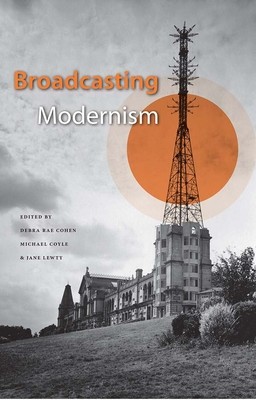
- We will send in 10–14 business days.
- Publisher: University Press of Florida
- ISBN-10: 0813044863
- ISBN-13: 9780813044866
- Format: 15.2 x 22.9 x 1.9 cm, softcover
- Language: English
- SAVE -10% with code: EXTRA
Broadcasting Modernism (e-book) (used book) | bookbook.eu
Reviews
Description
"A very solid and comprehensive collection of essays that allows readers to witness more concretely the variety of forms that the dialogue between literature and the radio has taken in the last century. An outstanding book."--Jean-Michel Rabate, author of Jacques Lacan and Literature
"This book is a real gift: its variety of essays in different voices provides an opportunity to get up to speed with the sometimes suprising ways that radio helped to structure modernism, served as a foil for modernist writers and artists, and forced the modernists into a more constructive engagement with issues of elite and popular culture. A lively collection."--Kevin J.H. Dettmar, author of Is Rock Dead?
It has long been accepted that film helped shape the modernist novel and that modernist poetry would be inconceivable without the typewriter. Yet radio, a key influence on modernist literature, remains the invisible medium.
The contributors to Broadcasting Modernism argue that radio led to changes in textual and generic forms. Modernist authors embraced the emerging medium, creating texts that were to be heard but not read, incorporating the device into their stories, and using it to publicize their work. They saw in radio the same spirit of experimentation that animated modernism itself.
Because early broadcasts were rarely recorded, radio's influence on literary modernism often seems equally ephemeral in the historical record. Broadcasting Modernism helps fill this void, providing a new perspective for modernist studies even as it reconfigures the landscape of the era itself.
Debra Rae Cohen is assistant professor of English at the University of South Carolina Michael Coyle is professor of English at Colgate University. Jane Lewty has published on radio and the work of Joyce, Woolf, and Pound.
EXTRA 10 % discount with code: EXTRA
The promotion ends in 17d.05:27:37
The discount code is valid when purchasing from 10 €. Discounts do not stack.
- Publisher: University Press of Florida
- ISBN-10: 0813044863
- ISBN-13: 9780813044866
- Format: 15.2 x 22.9 x 1.9 cm, softcover
- Language: English English
"A very solid and comprehensive collection of essays that allows readers to witness more concretely the variety of forms that the dialogue between literature and the radio has taken in the last century. An outstanding book."--Jean-Michel Rabate, author of Jacques Lacan and Literature
"This book is a real gift: its variety of essays in different voices provides an opportunity to get up to speed with the sometimes suprising ways that radio helped to structure modernism, served as a foil for modernist writers and artists, and forced the modernists into a more constructive engagement with issues of elite and popular culture. A lively collection."--Kevin J.H. Dettmar, author of Is Rock Dead?
It has long been accepted that film helped shape the modernist novel and that modernist poetry would be inconceivable without the typewriter. Yet radio, a key influence on modernist literature, remains the invisible medium.
The contributors to Broadcasting Modernism argue that radio led to changes in textual and generic forms. Modernist authors embraced the emerging medium, creating texts that were to be heard but not read, incorporating the device into their stories, and using it to publicize their work. They saw in radio the same spirit of experimentation that animated modernism itself.
Because early broadcasts were rarely recorded, radio's influence on literary modernism often seems equally ephemeral in the historical record. Broadcasting Modernism helps fill this void, providing a new perspective for modernist studies even as it reconfigures the landscape of the era itself.
Debra Rae Cohen is assistant professor of English at the University of South Carolina Michael Coyle is professor of English at Colgate University. Jane Lewty has published on radio and the work of Joyce, Woolf, and Pound.


Reviews